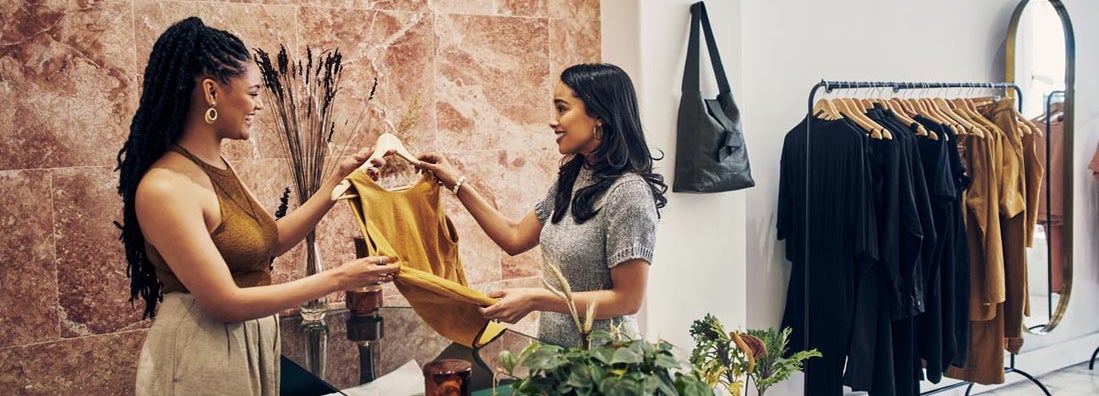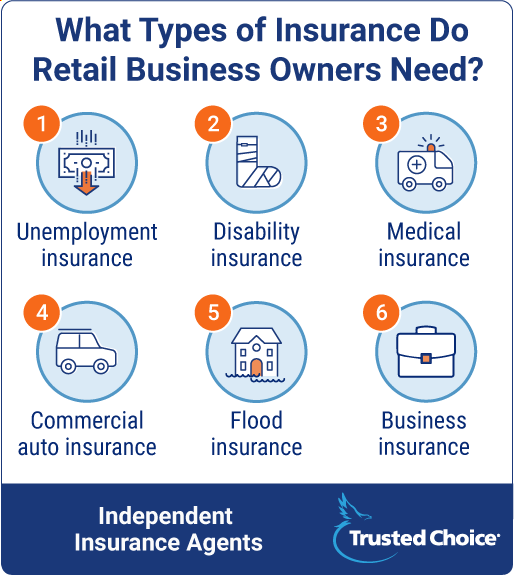Retail Insurance
Retail businesses may need a wide variety of insurance policies to properly cover their business.

Paul Martin is the Director of Education and Development for Myron Steves, one of the largest, most respected insurance wholesalers in the southern U.S.

Retail businesses are the bread and butter of the US consumer economy. You can find retail businesses in every small town across the country, and probably even more that are based out of a garage somewhere. While the operations of retail businesses may seem simple, they may require quite a few different insurance policies to be sufficiently protected.
Each retail business faces certain choices that will determine how it should be adequately covered. Do you use your vehicle to deliver your product? Do you sell online? Do you have employees? Do you own the building you’re selling from? These are questions that can help determine which type of retail insurance you need. And the best way to find retail insurance is through an independent insurance agent . who can help guide you through the process of finding what your business needs.
Who Sells Retail Insurance?
Most insurance companies that offer business insurance will be okay with insuring retail businesses. Retail is one of the most common types of business in the country and it’s fairly low-risk, especially when compared with professions like roofing contractors, so insurance companies rarely have a problem offering insurance to retail businesses.
When considering retail insurance, there are many different types of insurance policies that you might need. If you’re just going it alone and trying to buy insurance as inexpensively as possible through a company that offers online commercial quotes for small businesses, you’re likely to miss out on key coverage options.
The Best Retail Insurance Companies
There are many good companies out there that can insure your retail business at a competitive price. Just about any insurance company that sells business insurance will be able to offer you a quote on your retail business. And the best insurance company for one retail business may not be the best for another.
The best way for you to find a good insurance company for your retail business is to go through an independent insurance agent. They’ll have a strong company lineup and can make personalized recommendations that can fit your business the best.
- Best overall: The Hartford
The Hartford is available in all 50 states and is one of the largest insurance companies in the country, yet it still has done a good job of maintaining its small company feel. The Hartford has a specialized policy add-on for online retail businesses and has a strong BOP with many coverages.
Other trusted insurance companies that can offer quality retail insurance:
| Insurance companies that offer retail insurance | Star Rating |
| Liberty Mutual |

|
| Chubb |

|
| State Auto |

|
| Mercury |

|
| Travelers |

|
| West Bend |

|
| EMC Insurance |

|
| Stillwater |

|
| Hiscox |

|
| Great American |

|
| Main Street America |

|
| Central Insurance Companies |

|
| Philadelphia |

|
| Cincinnati |

|
| Erie |

|
| Westfield |

|
| Nationwide |

|
| Grange |

|
| Pekin |

|
| Selective |

|
Types of Retail Insurance Coverage
Retail insurance actually isn’t a separate type of insurance. It’s a combination of various commercial insurance policies that you can buy to give your retail business the proper coverage that it needs.
Retail is a fairly broad term that could mean consumer retail, wholesale retail, online retail, grocery retail, and more. Regardless of the type of retail that your business operates in, it’s important to have the right type of insurance, including the following:
| Retail Insurance Coverage Levels | Basic | Extra Options |
|---|---|---|
| Commercial Liability | ||
| Commercial Property | ||
| Business Income | ||
| Product Liability | ||
| Workers' Compensation | ||
| Commercial Auto | ||
| Crime Insurance | ||
| Cyber Insurance | ||
| Commercial Umbrella | ||
| Employment Practices |
Commercial general liability insurance
General liability insurance is one of the two most standard business insurance policies, along with commercial property. It’s sometimes abbreviated to CGL or just GL, for commercial general liability and general liability, respectively.
General liability insurance is fairly broad liability coverage that protects your business from bodily injury and property damage claims that you’re responsible for due to your business’s negligence. If a client or another business gets physically hurt, injured, or damaged by an accident and your business is involved somehow, this policy will pay for the cost of the other person’s injuries and property damage.
Commercial property insurance
Commercial property can include the building that you operate in, but it can also mean any business contents or equipment that you use specifically for your business. It can also mean stock and inventory. So even if you’re an online-only retailer, you could still benefit from having commercial property insurance.
With most insurance companies, you don’t need to insure a building in order to insure the contents of your business. This type of coverage is normally referred to as business personal property, or BPP for short. BPP coverage can include furniture, computers, and office supplies.
Here’s a brief overview of each type of loss settlement option:
- Actual cash value. Often shortened to ACV, this type of loss settlement insurance is the cheapest, but will also pay out the least amount of money if you have a claim. It factors in the age, condition, and depreciation of your property when arriving at a dollar amount for your claim.
- Replacement cost. This pays for the cost to repair or replace your property with similar kinds and quality of materials. It’s what most people expect to receive when they pay for insurance.
- Functional replacement cost. This option isn’t always available with every insurance company, but it’s essentially a combination of replacement cost and actual cash value.
- Agreed value. This is similar to replacement cost coverage, but agreed value is an amount that both the insurance company and the client agree upon.
Business owners policy
You can think of business owners policy, or BOP, as the business version of a homeowners insurance policy. It’s a combination of various commercial insurance coverages into one policy. It typically includes both general liability and commercial property coverage.
Taking a look at a BOP vs. commercial insurance
Most commercial insurance policies are bought a la carte. The final group of policies is often referred to as a commercial package policy, which could include general liability, commercial property, commercial auto, etc. For businesses that don’t need commercial property insurance, their package policy might just include general liability and commercial auto.
Having each commercial insurance policy separate enables the insurance agent to pick and choose what’s important and necessary for each business. If your retail business is small and you want property coverage, you’re probably going to find the best coverage and rates with a BOP. If you own a large retail business or don’t want property coverage, you’ll be better off with a commercial package policy.
Workers' compensation
Unless you’re operating an online-only retail business out of your home, you probably have some employees. Workers' compensation insurance is often required by each state, though some small businesses aren’t legally required to carry it.
Even if your business only has a few employees and might not be legally required to have workers' compensation, it’s almost always a good idea to buy it. Workers' comp covers the cost of workplace injuries and illnesses suffered by your employees.
Your workers' compensation rates will mainly be determined by your payroll, your workers' comp loss history, and the exact nature of your retail business. If you’re operating a large warehouse with dangerous equipment in it, your workers' comp rates will be quite a bit higher than if you just have one employee operating a cash register.

Other Retail Insurance Policies to Consider
Whether your retail business qualifies for a BOP or goes the a la carte commercial package route, there are many other insurance policies that your business may benefit from. Not every retail business will need all of the following types of insurance, but these can be useful for many of them.
Commercial auto insurance
If you’re using vehicles as part of your retail business in any capacity, chances are that you at least need hired and non-owned auto coverage. If you don’t have any vehicles that are owned and operated by the business, you can add hired and non-owned coverage to your general liability policy.
If you do have vehicles that are owned and operated by and for your retail business, then you’ll need a commercial auto policy. There are various levels of commercial auto insurance that offer varying degrees of coverage.
Retail business income insurance
Business income insurance is sometimes called business interruption insurance, but it’s the same thing. It kicks in only if you have a covered loss, but will then pay an average of your monthly income if you have to shut the doors to your store. Business income can make the difference between staying in business after a loss or having to permanently close.
If you’re on a BOP, chances are good that your BOP policy automatically includes coverage for lost income. If you’re on a commercial package policy, you may need to add this coverage separately.
Employers liability insurance
Employers liability insurance, also called employment practices liability insurance or EPLI, is never automatically included in a BOP. It’s a type of insurance that's similar to workers' compensation, and can be important coverage for retail businesses with many employees.
Employers liability covers your business for things such as:
- Sexual harassment
- Discrimination
- Breach of contract
- Infliction of emotional abuse
- Wrongful termination
- Failure to employ or promote
- Wrongful evaluations
- Mismanaging benefit plans
Employers liability insurance is an often-overlooked insurance policy that can end up being very costly for a retail business if they have a claim without insurance coverage.
Crime insurance
If you have a BOP, crime insurance is another thing that will probably be included with varying limits of coverage. Otherwise, it’s a separate policy that you can add to your commercial insurance package.
Crime insurance covers you for theft of money and securities by both criminals and your own employees. It also covers you for things like receiving counterfeit money, fraudulent money transfers, and forgery of documents.
Errors and omissions insurance
Errors and omissions insurance, or E&O for short, gives liability coverage for professional services and advice. If your retail business engages in these activities, then you probably need this type of insurance, but if you’re only selling products, then you may not need it. General liability will cover you for injuries that could happen as a result of your completed or manufactured products.
Cyber insurance
Cyber insurance covers your business against a variety of cyberattacks, such as malware and ransomware, hackers, or data breaches. Most cyberattacks are suffered by small businesses, as they are generally the most vulnerable.
The costs of cyberattacks could include the cost to shut down and repair your online infrastructure and network, as well as paying for reputation damage control with your customers, which will be even more costly if any of their personal data is stolen or compromised.
Commercial umbrella insurance
Commercial umbrella policies basically give you extra liability coverage, in excess of your general liability policy’s limits. If your retail business exhausts your general liability limits, you’ll be completely on the hook for any additional liability claims you might have for the rest of the policy period, until your general liability policy renews.
Finding Discounts and Savings on Retail Insurance
As with most commercial insurance policies, you normally won’t find traditional discounts like you do on personal insurance, like personal car insurance or homeowners insurance. But there are still numerous ways to save on your retail insurance premiums.
The only standard discount that may apply to a BOP or commercial package policy is a multi-policy discount. And even this normally doesn’t apply to any other commercial policy. It mainly applies to adding a commercial auto policy to your property insurance or BOP.
If you don’t have a BOP, you still might be able to save quite a bit of money on your insurance by having a business that qualifies for credit. On commercial insurance accounts, insurance companies have the ability to put credit on your policy. The amount of credit can vary considerably, anywhere from 5% to 40% or 50%. Companies also want to balance offering low and competitive premiums with having enough premium to balance their books and account for potential claims, so you can’t always get a high amount of credit on your policy.
The three main things that insurance companies will look at when applying credit to your retail business are:
- Market appetite. If an insurance company looks at their commercial accounts and decides it wants to have more retail businesses on its books, then it is likely to be more willing to offer higher credit in order to be more competitive with retail. If the company is saturated with retail accounts, they probably won’t offer much credit on the policy.
- Loss history. Generally, businesses are only eligible for credit if they have a good loss history, especially in the last 3 to 5 years. Multiple losses, particularly large ones, will disqualify businesses from receiving credit most of the time, unless the company is desperate to win that particular business.
- Your overall level of risk. Beyond looking at your loss history, the insurance company will look at your business’s overall likelihood of having a claim. Is your building up-to-date and in excellent condition? Do you have an employee training and safety program in place? They’ll take a look at your overall business and if everything looks in great shape, they’ll probably be willing to offer some credit.
Comparing Retail Insurance Plans
By working with a trusted and local independent insurance agent, you’ll receive multiple quotes from many reputable companies in the retail insurance world. Your agent will guide you through what each coverage option means and will recommend the appropriate coverage limits for your business. And if you do have a claim, you’ll have a trusted adviser by your side who can go to bat for you if there’s any problem with your claim.
Frequently Asked Questions about Retail Insurance
The exact type of insurance that your retail business needs will depend on the nature of your business. If you’re renting a building, you probably won’t need property insurance, but will still probably want coverage on your business personal property. At the very least, you’ll want a general liability policy and probably a cyber insurance policy, but anything beyond that will largely depend on the size and nature of your retail business.
There is no set or average amount for retail insurance, because retail businesses are very different from one another. A small-town retail store on Main Street may pay $1,000 a year on its BOP, while a growing retail business in a large city with expanding operations and robust online sales may pay $50,000 a year. Your premiums will largely be based on the size of your business and your loss history.
Possibly. While carrying retail insurance isn’t mandatory by law in each state like having personal auto insurance, it could be required by your bank if you have a business loan. It could also be required on a lease if you’re renting your retail space. And if you’re relying on other distributors for supplies, they might require some type of insurance before doing business with you.
The purpose of retail insurance is to protect the business from a large variety of things that could go wrong. Property insurance provides money if your business has a physical loss, such as a fire or theft. Liability insurance covers you if your business is responsible for somebody else’s injuries or property damage. And workers' compensation insurance covers your employees for injuries or illnesses suffered while on the job.
iii.org
